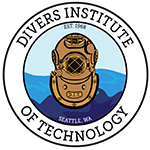What do they do?
Work below surface of water, using surface-supplied air or scuba equipment to inspect, repair, remove, or install equipment and structures. May use a variety of power and hand tools, such as drills, sledgehammers, torches, and welding equipment. May conduct tests or experiments, rig explosives, or photograph structures or marine life.
Also known as:
Commercial Diver, Diver, Diver Tender, Hard Hat Diver, Non Destructive Testing Under Water Welder (NDT U/W Welder), Salvage Diver, Tender
-
6.8%
Change
Select a state to see its job growth rate ranking500Job Openings
Select a state to see its net job growth ranking
Looking for colleges that offer a specific major? Use the College Match Tool to find your best-matched schools and discover your estimated Net Price!
- High school diploma equivalent (39%)
- Some college, no degree (27%)
- Less than high school diploma (13%)
- Associate's degree (10%)
- Bachelor's degree (9%)
- Master's degree (1%)
- Doctorate or Professional Degree (<1%)
People in this career often have these skills:
- Critical Thinking - Using logic and reasoning to identify the strengths and weaknesses of alternative solutions, conclusions, or approaches to problems.
- Active Listening - Giving full attention to what other people are saying, taking time to understand the points being made, asking questions as appropriate, and not interrupting at inappropriate times.
- Operations Monitoring - Watching gauges, dials, or other indicators to make sure a machine is working properly.
- Speaking - Talking to others to convey information effectively.
- Quality Control Analysis - Conducting tests and inspections of products, services, or processes to evaluate quality or performance.
- Operation and Control - Controlling operations of equipment or systems.
- Time Management - Managing one's own time and the time of others.
People in this career often know a lot about:
- Mechanical - Knowledge of machines and tools, including their designs, uses, repair, and maintenance.
- Building and Construction - Knowledge of materials, methods, and the tools involved in the construction or repair of houses, buildings, or other structures such as highways and roads.
- Physics - Knowledge and prediction of physical principles, laws, their interrelationships, and applications to understanding fluid, material, and atmospheric dynamics, and mechanical, electrical, atomic and sub-atomic structures and processes.
People in this career often have talent in:
- Oral Comprehension - The ability to listen to and understand information and ideas presented through spoken words and sentences.
- Oral Expression - The ability to communicate information and ideas in speaking so others will understand.
- Problem Sensitivity - The ability to tell when something is wrong or is likely to go wrong. It does not involve solving the problem, only recognizing that there is a problem.
- Arm-Hand Steadiness - The ability to keep your hand and arm steady while moving your arm or while holding your arm and hand in one position.
- Control Precision - The ability to quickly and repeatedly adjust the controls of a machine or a vehicle to exact positions.
- Multilimb Coordination - The ability to coordinate two or more limbs (for example, two arms, two legs, or one leg and one arm) while sitting, standing, or lying down. It does not involve performing the activities while the whole body is in motion.
- Manual Dexterity - The ability to quickly move your hand, your hand together with your arm, or your two hands to grasp, manipulate, or assemble objects.
- Finger Dexterity - The ability to make precisely coordinated movements of the fingers of one or both hands to grasp, manipulate, or assemble very small objects.
- Deductive Reasoning - The ability to apply general rules to specific problems to produce answers that make sense.
- Information Ordering - The ability to arrange things or actions in a certain order or pattern according to a specific rule or set of rules (e.g., patterns of numbers, letters, words, pictures, mathematical operations).
- Near Vision - The ability to see details at close range (within a few feet of the observer).
- Speech Recognition - The ability to identify and understand the speech of another person.
- Inductive Reasoning - The ability to combine pieces of information to form general rules or conclusions (includes finding a relationship among seemingly unrelated events).
- Extent Flexibility - The ability to bend, stretch, twist, or reach with your body, arms, and/or legs.
- Perceptual Speed - The ability to quickly and accurately compare similarities and differences among sets of letters, numbers, objects, pictures, or patterns. The things to be compared may be presented at the same time or one after the other. This ability also includes comparing a presented object with a remembered object.
People in this career often do these activities:
- Monitor work areas or procedures to ensure compliance with safety procedures.
- Clean equipment, parts, or tools to repair or maintain them in good working order.
- Maintain work equipment or machinery.
- Communicate with coworkers to coordinate installations or repairs.
- Travel to work sites to perform installation, repair or maintenance work.
- Gather information about work conditions or locations.
- Train others in operational procedures.
- Supervise employees.
- Inspect systems to determine if they are operating properly.
- Test mechanical equipment to ensure proper functioning.
- Repair non-engine automotive or vehicle components.
- Attach rigging to objects so they can be moved.
- Operate cranes, hoists, or other moving or lifting equipment.
- Record images needed to address work issues.
- Operate welding equipment.
- Install piping for installation or maintenance activities.
- Repair pipes to stop leaking.
- Install structural foundations.
- Survey land or bodies of water to measure or determine features.
- Repair production equipment or tools.
- Repair structural components.
- Respond to emergencies to provide assistance.
- Drill holes in parts, equipment, or materials.
- Decontaminate equipment or sites to remove hazardous or toxic substances.
- Organize recreational activities or events.
- Harvest agricultural products.
This page includes data from:

 Occupation statistics: USDOL U.S. Bureau of Labor Statistics Occupational Employment Statistics
Occupation statistics: USDOL U.S. Bureau of Labor Statistics Occupational Employment Statistics
 Videos: CareerOneStop, USDOL/ETA and the Minnesota Department of Employment & Economic Development
Videos: CareerOneStop, USDOL/ETA and the Minnesota Department of Employment & Economic Development







